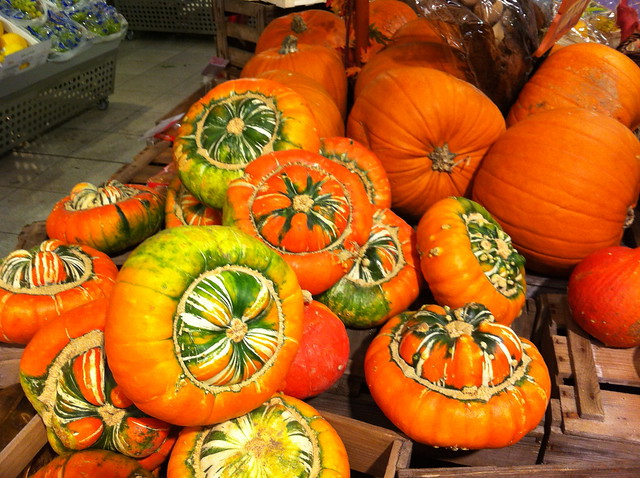It's starting to get chilly over here at the Meldrumhaus, and there's no getting around it: it fills like fall for rill. (This silly spelling is based on the accent often used in the Intermountain West region of the United States and translates roughly as "it feels like fall for real.")
While we're sad to leave the (obnoxiously rainy) summer months behind, the clear, blue days are really beautiful, and it's nice to sit down to a mug of tea in the evenings. Also, we've been thinking about the really cold weather to come. I've acquired my first real winter coat in over five years, Sara has some new waterproof shoes, and we're going to Paris and Brussels with my brother, Jaren, the week before Christmas. It's pretty exciting.
A couple of visual indicators of this transformation in Aachen. The tree outside our house is changing colors:

There are beautiful pumpkins and other gourds at the store:

And the Weckmänner are here:

These last guys are pretty interesting. I saw them for the first time about a week ago walking by our local (and currently favorite) bakery, Moss; turns out they're all over town now. They're made of a slightly sweet dough with two raisins for eyes and a sugar cube navel (other varieties exist that don't use sugar cubes), and they hold pipes made of clay. As best as we can tell, they're the symbol for Saint Martin's Day (November 11). Saint Martin was a kind soldier who lived in the 4th century AD. Once, while walking/riding around, he saw a beggar in the cold. Being so benevolent, St. Martin took out a knife and cut his cloak in two and gave half to the beggar. (He kept half so he himself wouldn't die in the cold, apparently.) To honor Martin's generosity, on the 10th children will make little paper lanterns and then the following day will go around in a parade where they will be rewarded with candy and other small treats, including Weckmänner. I don't really know how the Weckmänner came to be the symbol for this festival, but they are pretty good! (Sadly, we'll be traveling by train to Berlin on St. Martin's Day, so we may not have much by way of pictures to post this year. Hopefully we'll see something in Berlin and can photograph and report.)
As we learn more and more German, we find more and more to share with you. This time I have some stories relating to the culture of addressing people, both formally with "Sie" and informally with "du." Lots of languages have two forms of address, including Spanish, Lithuanian, and, formerly, English (you and thou were formal and informal, respectively). The culture of when to address people formally and when informally varies quite a bit within the languages. For example, in (Argentine) Spanish, people almost exclusively use "vos" (informal) unless addressing a much older complete stranger. In Lithuanian, I use "Jūs" (formal) with people I don't know and people who are older than me, but otherwise it's usually "tu" (informal). While I anticipated some level of formality in German, it turns out to be more austere than I expected. For example, at a recent conference in Bonn, it came up that I address the professor with whom I work by his first name. The German graduate students I was speaking with were stunned. "You... you say, 'Bernhard' and not 'Professor Blümich?'" They just couldn't understand that level of informality with a professor, someone who commands respect. They told me that they always use "Sie" with their professors, who use it with them in return, and that often even professors address each other with the formal "Sie" and use last names, rather than first names.
Sara had two interesting stories relating to using "Sie" and "du." A few weeks ago, she was auditioning for the Aachen Bach choir. During the audition, the director and Sara used "Sie," since they didn't know one another. After the audition, the director (unsurprisingly) liked Sara's singing and invited her to join the choir if she wished. He very politely and formally asked, "Oh, one thing. In the choir we use first names and 'du.' Is that okay with you?" Such a ritual, a definite event, to define how choir members should address one another!
A similar process took place last Saturday where Sara, looking for opportunities to work in any library, volunteered for a "Freiwilling für Aachen" (a city-wide volunteer day) event in a church-community center near us. The director asked the three volunteers to introduce themselves, each of whom talked for approximately five minutes, recounting lots of personal details like loss of employment and divorce. (Sara gave her standard, three-German-sentences introduction.) After introductions, another volunteer suggested that, to keep things easy for Sara, they should use first names rather than "Frau So-and-so." The volunteers agreed, but the director then asked, "Well, if we're using first names, should we use 'du,' too?" They all consented and, after the ritual of establishing "du-ism," the work commenced. Interestingly, when another volunteer showed up after the work had begun, the director quickly pulled her aside to introduce the protocol: "We're using first names, and we're using 'du.'" Pretty crazy how defined the "du"/"Sie" relationships are!
I was thinking about a Lithuanian verb "tujinti," which means to address someone with the informal form "tu." I thought that surely German has an equivalent, though we hadn't heard it yet. Sure enough, "duzen" and "siezen" mean "to address someone with 'du'" and "to address someone with 'Sie,'" respectively. German precision at its finest.
While we're sad to leave the (obnoxiously rainy) summer months behind, the clear, blue days are really beautiful, and it's nice to sit down to a mug of tea in the evenings. Also, we've been thinking about the really cold weather to come. I've acquired my first real winter coat in over five years, Sara has some new waterproof shoes, and we're going to Paris and Brussels with my brother, Jaren, the week before Christmas. It's pretty exciting.
A couple of visual indicators of this transformation in Aachen. The tree outside our house is changing colors:

There are beautiful pumpkins and other gourds at the store:

And the Weckmänner are here:

These last guys are pretty interesting. I saw them for the first time about a week ago walking by our local (and currently favorite) bakery, Moss; turns out they're all over town now. They're made of a slightly sweet dough with two raisins for eyes and a sugar cube navel (other varieties exist that don't use sugar cubes), and they hold pipes made of clay. As best as we can tell, they're the symbol for Saint Martin's Day (November 11). Saint Martin was a kind soldier who lived in the 4th century AD. Once, while walking/riding around, he saw a beggar in the cold. Being so benevolent, St. Martin took out a knife and cut his cloak in two and gave half to the beggar. (He kept half so he himself wouldn't die in the cold, apparently.) To honor Martin's generosity, on the 10th children will make little paper lanterns and then the following day will go around in a parade where they will be rewarded with candy and other small treats, including Weckmänner. I don't really know how the Weckmänner came to be the symbol for this festival, but they are pretty good! (Sadly, we'll be traveling by train to Berlin on St. Martin's Day, so we may not have much by way of pictures to post this year. Hopefully we'll see something in Berlin and can photograph and report.)
As we learn more and more German, we find more and more to share with you. This time I have some stories relating to the culture of addressing people, both formally with "Sie" and informally with "du." Lots of languages have two forms of address, including Spanish, Lithuanian, and, formerly, English (you and thou were formal and informal, respectively). The culture of when to address people formally and when informally varies quite a bit within the languages. For example, in (Argentine) Spanish, people almost exclusively use "vos" (informal) unless addressing a much older complete stranger. In Lithuanian, I use "Jūs" (formal) with people I don't know and people who are older than me, but otherwise it's usually "tu" (informal). While I anticipated some level of formality in German, it turns out to be more austere than I expected. For example, at a recent conference in Bonn, it came up that I address the professor with whom I work by his first name. The German graduate students I was speaking with were stunned. "You... you say, 'Bernhard' and not 'Professor Blümich?'" They just couldn't understand that level of informality with a professor, someone who commands respect. They told me that they always use "Sie" with their professors, who use it with them in return, and that often even professors address each other with the formal "Sie" and use last names, rather than first names.
Sara had two interesting stories relating to using "Sie" and "du." A few weeks ago, she was auditioning for the Aachen Bach choir. During the audition, the director and Sara used "Sie," since they didn't know one another. After the audition, the director (unsurprisingly) liked Sara's singing and invited her to join the choir if she wished. He very politely and formally asked, "Oh, one thing. In the choir we use first names and 'du.' Is that okay with you?" Such a ritual, a definite event, to define how choir members should address one another!
A similar process took place last Saturday where Sara, looking for opportunities to work in any library, volunteered for a "Freiwilling für Aachen" (a city-wide volunteer day) event in a church-community center near us. The director asked the three volunteers to introduce themselves, each of whom talked for approximately five minutes, recounting lots of personal details like loss of employment and divorce. (Sara gave her standard, three-German-sentences introduction.) After introductions, another volunteer suggested that, to keep things easy for Sara, they should use first names rather than "Frau So-and-so." The volunteers agreed, but the director then asked, "Well, if we're using first names, should we use 'du,' too?" They all consented and, after the ritual of establishing "du-ism," the work commenced. Interestingly, when another volunteer showed up after the work had begun, the director quickly pulled her aside to introduce the protocol: "We're using first names, and we're using 'du.'" Pretty crazy how defined the "du"/"Sie" relationships are!
I was thinking about a Lithuanian verb "tujinti," which means to address someone with the informal form "tu." I thought that surely German has an equivalent, though we hadn't heard it yet. Sure enough, "duzen" and "siezen" mean "to address someone with 'du'" and "to address someone with 'Sie,'" respectively. German precision at its finest.
What does Weckmanner mean? Something -men? They look a bit like aliens with those big eyes . . . And the enormous white belly buttons are freaky!
ReplyDeleteI think "Weckmann" is something like "waking man," but I'm not exactly sure what that means. Wecken is a wake-up or a reville, so I'm assuming it's related. But I can't tell for sure, and if it is "waking man," I don't know whom they are waking.
ReplyDeleteHey! What are you going to be doing in Berlin?! How long will you be there? Maybe I could jet down and say "hi!" Using the du-form of course.
ReplyDeleteNope, it's not "waking man," it's "bread" or "bun man." A Weckchen is a kind of bun that comes with or without raisins.
ReplyDeleteHeidi--That would be great! We'll be there the 12-14 of November (with travel days on either end). Ty is giving a talk in his friend's lab and (hopefully) meeting with some people at a museum there to talk about analyzing some fake paintings they have.
WOO! We could probably only come on the Saturday or the Sunday and we'd like to maybe go see the Egyptian museum or something else on Museum Island, or go out to Potsdam Palace since we didn't make it out the last time we were in Berlin--if you or you both were looking for something to do?
ReplyDeleteOr we'd just tag along with you for whatever. But we wouldn't want to be annoying or get in your way or anything--it would probably be a half-day thing for us since the train takes about 2 and a half hours each way.
But, we're still a month or so out--so there's time to plan. And also time to realize we may need a raincheck if there's a conflict with Paul's work or whathaveyou.
I think it would be fun to meet you guys though--if we can swing it!
Hrmmm...I just went over to the deutsche-bahn website to check prices and I'm not sure if we will be able to budget in a 70 euro one-day train trip the same month we're needing to put down our aquahaus deposit and real estate fees and do our Turkey trip...
ReplyDeleteI'll consult the Quicken.
But, regardless of the budget, there is one thing you reeeallly, really, really should try if you're going to be in the Berlin Hauptbahnhof at all (I think you are). There's a take-out/restaurant in the station (maybe, on the 2nd level I think?) that sells Doner Kebabs. They're fantastic!
Some days I think it would be worth a 70 euro train trip just to get one again.
I love that there's so many conversations about the Sie/du thing. Do people ever change depending on their mood? Like if you guys were having a fight (not that you do that) you could be all, "We're having this one in Sie, buddy!" Then again, I guess that would mean that you'd be fighting in German, which would be a little weird too. Unless you've forgotten how to speak English.
ReplyDeleteOkay, I'm getting back to work now.
Ha ha. We have yet to fight in German. Our skills are not yet up to it. If we ever get to the point of fighting effectively in German that will be a proud day.
ReplyDeleteI have a somewhat different problem with du/Sie, especially while biking. Drivers aren't terribly aware of what they're doing, so whenever I have a near-miss on my bike (about twice a week), I start thinking bad things about the driver using "du." But then I see the driver and, if they're older than I am, I start panicking, thinking, "Should I be angry at them in 'du' or 'Sie?'" It's really problematic and potentially dangerous.
ReplyDelete